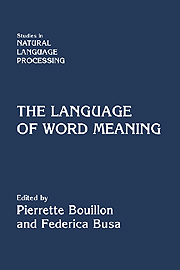Book contents
- Frontmatter
- Contents
- List of Contributors
- Preface
- Introduction: Word Meaning and Creativity
- Part I Linguistic Creativity and the Lexicon
- Part II The Syntax of Word Meaning
- 6 Introduction
- 7 Type Construction and the Logic of Concepts
- 8 Underspecification, Context Selection, and Generativity
- 9 Qualia and the Structuring of Verb Meaning
- 10 Sense Variation and Lexical Semantics: Generative Operations
- 11 Individuation by Partitive Constructions in Spanish
- 12 Event Coreference in Causal Discourses
- Part III Interfacing the Lexicon
- Part IV Building Resources
- Index
6 - Introduction
Published online by Cambridge University Press: 07 October 2011
- Frontmatter
- Contents
- List of Contributors
- Preface
- Introduction: Word Meaning and Creativity
- Part I Linguistic Creativity and the Lexicon
- Part II The Syntax of Word Meaning
- 6 Introduction
- 7 Type Construction and the Logic of Concepts
- 8 Underspecification, Context Selection, and Generativity
- 9 Qualia and the Structuring of Verb Meaning
- 10 Sense Variation and Lexical Semantics: Generative Operations
- 11 Individuation by Partitive Constructions in Spanish
- 12 Event Coreference in Causal Discourses
- Part III Interfacing the Lexicon
- Part IV Building Resources
- Index
Summary
The contributions in this section are centered around a set of common themes:
developing a theoretical vocabulary sufficiently rich to understand how word meanings compose;
developing and motivating frameworks for lexical semantics with explanatory force;
analyzing cross-linguistic data for achieving linguistically independent models.
Although each contribution approaches the problems from different angles and different data sets, they all highlight the richness of the information carried by words in context. The real challenge, as it emerges from the papers, is whether it is possible to establish a clear boundary between people's words and people's worlds or experiences. The goal is to understand whether there is a level of representation that is independent of specific contextual variations, while accounting for the novel use of words in different contexts.
The authors reach different conclusions: some reject structured representations of lexical information, others show that it is precisely in the structuring of the lexicon that we can achieve an understanding of how meaning changes in context.
The first paper by James Pustejovsky presents recent developments in GL, focusing on the role of qualia structure as a syntax for creating new concepts. The paper addresses fundamental questions on the well-formedness of concepts, the combinatorial possibilities within a generative mental lexicon, and how these principles are motivated by linguistic evidence.
The contribution by Jacques Jayez focuses on the meaning variations of the French verbs “suggerer” (suggest) and “attendre” (wait).
- Type
- Chapter
- Information
- The Language of Word Meaning , pp. 89 - 90Publisher: Cambridge University PressPrint publication year: 2001



